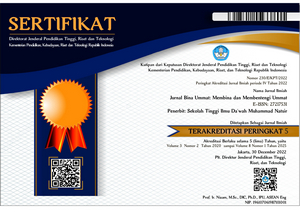KONSEP PERENCANAAN DALAM MANAJEMEN PENDIDIKAN ISLAM
DOI:
https://doi.org/10.38214/jurnaldawahstidnatsir.v6i2.205Keywords:
Islamic Education Management, Planning Concept, and Education QualityAbstract
The necessity to advance high-quality Islamic education underscores the need for appropriate planning concepts within Islamic education management. This journal explores the concept of planning in the context of Islamic education management as an effort to understand the principles that underpin the development of an effective Islamic education system. Within this context, this research delineates various critical aspects, including curriculum development, resource management, quality learning, and evaluation.
Through theoretical analysis and case studies, this journal identifies several relevant conceptual approaches that can be employed in Islamic education planning. The significance of integrating Islamic values into the curriculum and teaching methods, as well as efficient resource management, takes center stage in this article.
The findings of this research will provide valuable insights for decision-makers in Islamic educational institutions, curriculum developers, and other stakeholders striving to enhance the quality of Islamic education. Sound planning concepts are a crucial foundation for achieving comprehensive and sustainable goals in Islamic education.
Published
How to Cite
Issue
Section
Copyright (c) 2023 Jurnal Da'wah: Risalah Merintis, Da'wah Melanjutkan

This work is licensed under a Creative Commons Attribution 4.0 International License.
This work is licensed under a Lisensi Creative Commons Atribusi 4.0 Internasional.
Authors who publish with this journal agree to the following terms:
- Authors retain copyright and grant the journal right of first publication with the work simultaneously licensed under a Creative Commons Attribution License that allows others to share the work with an acknowledgment of the work's authorship and initial publication in this journal.
- Authors are able to enter into separate, additional contractual arrangements for the non-exclusive distribution of the journal's published version of the work (e.g., post it to an institutional repository or publish it in a book), with an acknowledgment of its initial publication in this journal.
- Authors are permitted and encouraged to post their work online (e.g., in institutional repositories or on their website) prior to and during the submission process, as it can lead to productive exchanges, as well as earlier and greater citation of published work (See The Effect of Open Access).




